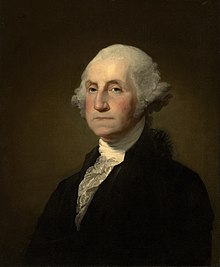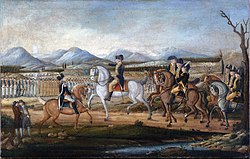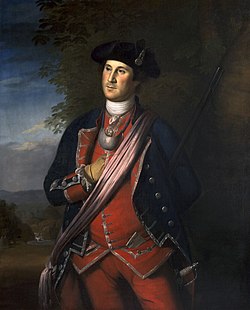Wikijunior:American Founding Fathers/George Washington
Who is this?
[edit | edit source]George Washington
What did he do that made him important?
[edit | edit source]George Washington (1732-1799) is the best known and most important founding father. Before becoming President, he was a soldier, serving as a colonel in the French and Indian War and as the leader of the Continental Army during the American Revolution against England. He was also head of the Constitutional Convention, when the United States wrote the basic laws that govern our country. He is called the “Father of Our Country” because without him, many believe that the United States would not have existed, at least as we know it.
Commander-in-Chief
[edit | edit source]
George Washington was unanimously selected Commander-in-Chief of the American Army in June 1775. Washington was offered pay for the job, but he declined any money, except for his expenses. He went to Boston where the army had surrounded the city and trapped the British inside. In March 1776, Washington forced the British to evacuate the city by putting cannon on top of hills outside of the city. Washington then led his army to New York City, and the British attacked in August 1776. The Americans were defeated and forced to retreat. They were defeated over and over again and forced to fall back into New Jersey, and then into Pennsylvania. It seemed like the revolution was lost, because the troops contracts would end in one week. Washington knew he had to save his army, and so he came up with a daring plan. He led his army across the Delaware River, back into New Jersey on Christmas Night, 1776, in the middle of a blizzard. After a dangerous crossing, Washington marched his army to Trenton, where they surprised, and defeated the Hessians (Soldiers the British hired from Germany). About 900 Hessians were captured. This victory changed the American soldiers minds about wanting to go home, and they agreed to stay longer. The next week, on January 3, Washington attacked Princeton New Jersey. It seemed like the Americans were going to lose but then Washington rode out on his horse, rallied his soldiers, and defeated the British. This victory forced the British to leave New Jersey.
In 1777, the British attacked Philadelphia, and Washington moved his army to stop them, but he was defeated at Brandywine, south of the city. An attempt by Washington to retake the city failed in October, and he was forced to withdraw to Valley Forge, Pennsylvania. That winter, over 2,000 of his troops died from starvation or the cold. Many men left, and it looked like the army would fall apart. But Washington never gave up. He worked the whole day, everyday, to get food and blankets for his soldiers, and the army held together. When spring came in 1778, the army was trained by Baron von Steuben, a Prussian soldier. In June, the British left Philadelphia, and went to New York. While they were on their way, Washington attacked them, at Monmouth, New Jersey. At first it looked like the Americans would be defeated because a General had retreated when Washington had told him not to. However, Washington came onto the field, and, once again, rallied his troops and forced the British back.
In 1779 and 1780, Washington did not fight any battles against the British. The British had decided to attack in the south and work their way up the colonies. Washington left his army in the Hudson Valley in New York to make sure the British would not attack up the Hudson River.
In August 1781, Washington received news that a French Fleet(The French were allies with the Americans) was going to go to Virginia. Washington knew that there was a British army under the command of Charles Cornwallis at Yorktown Virginia. He decided to move his army down south and surround the British Army, while the French Fleet blocked the sea so they could not escape. After bombing Yorktown with cannons for almost a month, the British Army surrendered. The Americans and French captured 9,000 British soldiers.

After Yorktown, the British and Americans began to talk to each other and tried to make peace. While they did this, Washington moved his army to Newburgh, New York. In March 1783, the officers in the army who had not been paid in a long time, decided that they were going to go to Philadelphia, and march to Congress, who was supposed to pay them. Washington realized that if they did this, his army would fall apart. He called for a meeting with his officers, and gave a magnificent speech, but his officers were not convinced. Washington then took out a letter from Congress and tried to read it, but he could not, so he took out his spectacles. He said "Gentlemen, you will permit me to put on my spectacles, for I have not only grown gray but almost blind in the service of my country." When he said this, his officers realized how hard Washington had worked to give American its independence, and they began to cry. Washington finished reading the letter, and then left the room. The officers pledged their loyalty and promised not to march to Congress.
Peace was signed with Great Britain on September 3, 1783, and the soldiers went home. On December 23, Washington resigned as Commander-in-Chief. Washington was offered to become king, and could have easily taken over the government as many others have done in the past, but he did not want to become king and believed that a Republic was better. After resigning, Washington retired to his home, Mount Vernon Virginia, and arrived just in time for Christmas.
Presidency
[edit | edit source]
Washington came out of retirement in 1787 and was unanimously elected to be the President of the Philadelphia convention. At the convention, the Constitution was drafted and it replaced the Articles of Confederation. Not everyone supported the Constitution, but Washington did, and his support convinced many states to pass it.
In 1789, Washington was unanimously elected President of the United States. He had not wanted to be president, but he thought that if he did not become president, the country would fall apart. Congress voted to pay him $25,000 but he declined. After thinking it over, he decided to take it to show that you did not have to be wealthy to become president. People argued over what to call the president, some wanted him to be called "His Highness the President of the U.S. and protector of their liberties" but Washington preferred the simple name "Mr. President". At first Washington met with all of his advisors separately, but he decided this was not the best thing to do, and he met with them all together.

In 1792, Washington wanted to retire back to Mount Vernon, but he still feared that the country could not survive without him, so he decided to run again. He was, once again, unanimously voted President. In 1794, a new tax on Whiskey angered many people living on the frontier in Pennsylvania. Protests turned into riots, and Washington knew that if he did not take action, it would show other parts of the country that they could revolt. Washington personally took command of the militia, and when the rioters saw that he was in command, they ran away.
Later in 1794, threat of another war with Great Britain prompted Washington to send diplomat John Jay to London to negotiate a treaty. He did, and it was called the Jay Treaty. The treaty had the British move off of forts on American territory, and the United States increased trade with Britain. The treaty was not popular, but it was passed, and avoided war with Britain.
In 1796, Washington announced he would not run for President again. He wrote his Farewell address, in which he said that America should not go into European Wars, and should not engage in permanent alliances with any nation. He also advised against Political Parties. In March 1797, Washington once again retired to Mount Vernon.
What did he do when he was young?
[edit | edit source]
George Washington was born on February 22, 1732, on the Potomac River southeast of modern-day Colonial Beach in Westmoreland County, Virginia. When George was 11 years-old, his father died. From the point on he looked up to his half brother, Lawrence Washington, as his father. Lawrence wanted Washington to join the British Navy in 1747, but George's mother, Mary Bell Washington, put her foot down and said no. Because of his father's death, George did not go to England to school like his other brothers had. Instead, Lawrence and others tutored him. In 1749, George became a surveyor. Lawrence died in 1752, and he left his property to George, who named it Mount Vernon. There is an old story that George chopped down a cherry tree, and when his father questioned him about it, George said "Father, I cannot tell a lie. I did it with my hatchet." Most historians today believe that it is a myth.
Through family connections, George became a Major in 1752 in the Virginia Militia. In the early 1750s Washington was used as an ambassador to the French trappers on the Western Frontier in the Ohio River Valley. His most important mission came in 1753, when Governor Dinwiddie of Virginia sent Washington with an ultimatum to demand that the French leave the territory claimed by Virginia. While he was there, Washington was asked to assess the French military strength. Washington successfully completed his mission, although he almost died on the trip. The French response was clear, they would not leave. Afterward Washington was promoted to Lieutenant Colonel.
In 1754, Washington was again sent to the Frontier. He was sent with a regiment of soldiers to reinforce a fort that was being constructed at current day Pittsburgh. However, before he got there, the French arrived and ordered the Colonists to leave. The French built Fort Duquesne in its place. After receiving this news, Washington received more news. A French party of soldiers was advancing through the wilderness towards Virginia. Washington believed that they were a raiding party, and in response, he ambushed them, on May 28. Along with some help from Native American allies, the French party was defeated. The leader of the French party was wounded, and handed Washington some papers that showed that they were on a diplomatic mission. While Washington was reading the papers, one of his Native American allies came up and smashed the Frenchman's head, washing his hands in his brain.
Washington began to build a Fort, and called it Fort Necessity. Washington assumed that the French would attack, and they did on July 3. After a day long battle, the larger French and Indian force forced Washington to surrender. In the surrender document, which was in French which Washington could not read, it said that Washington had assassinated the French leader. The French allowed Washington and his men to return to Virginia. Washington was not blamed for the defeat but the Militia was reorganized, and Washington would have been demoted to Captain. Unhappy with this, he resigned.
In 1755, Washington became an Aide to Edward Braddock's expedition to take Fort Duquesne. On the march, the British were ambushed, and Braddock killed. Washington took command, and made an orderly retreat. He became known as the Hero of the Monongahela. Washington was promoted to Colonel. He was given control on the Virginia Militia.

Over the next three years, Washington turned the Virginia Militia into one of the finest fighting machines in the colonies. They skirmished with the French and Indians, and in 1758, launched another expedition, called the Forbes Expedition, led by John Forbes. A first assault on Fort Duquesne failed, but the French commander knew he could not hold out much longer. Therefore, he abandoned the fort, burning it to the ground. The British came and built a new one in its place, called Fort Pitt. After this victory, Washington retired from the military, and went to Mount Vernon.
In 1759, Washington married Martha Dandridge Custis, one of the wealthiest widows in the colonies. With this marriage, he expanded his property to 6,500 acres by 1775. In 1758 he was elected to the House of Burgesses, the Virginia provincial legislature. Washington resented the taxes that Britain imposed onto the colonies, and became actively involved in opposition in 1767. In May 1769, Washington introduced a proposal drafted by his friend George Mason which called for Virginia to boycott English goods until the Acts were repealed. They were repealed in 1770. However, the Intorable acts were passed in 1773, and he called them "an Invasion of our Rights and Privileges". In 1774, he was elected as a delegate to the First Continental Congress.
What did he do afterward?
[edit | edit source]After he retired in 1797, Washington returned Mount Vernon. But he was not retired for long. In 1798, it looked like that the United States would go to war with France and John Adams, the new president, thought that George Washington should take control of the Army. Washington reluctantly did, and began to organize and train the army. When the crisis with France passed in 1799, Washington returned to Mount Vernon. On December 12, 1799, he was out inspecting his plantation in the rain and hail. He did not wash up before eating, and he developed an infection in the throat. The Doctors treatment did not help him, it only made him worse. On December 14, 1799 George Washington died. In his will he had all of his, and his wife's slaves freed on her death.
How is he remembered today?
[edit | edit source]Today, countless things are named after George Washington. His face is on the One Dollar Bill and on the Quarter. His face is on Mount Rushmore. The Capital of the United States in named Washington D.C. in his honor. 33 counties, 244 townships, 16 mountains, 1 state, 2 islands, 6 major parks, 1 parkway, 1 major bridge, 3 ports, 5 forts, 11 Universities, countless number of schools, and streets are all named after George Washington.